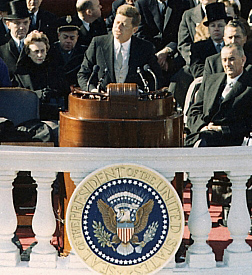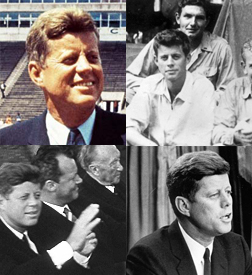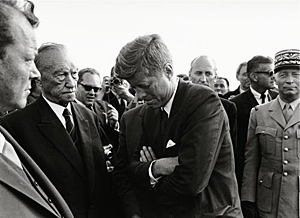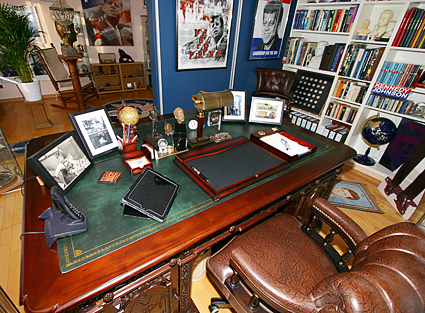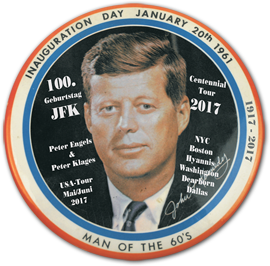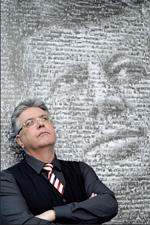
JFK life
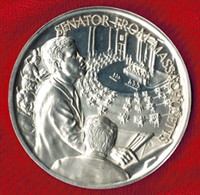
Massachusetts Senator
|
Senate
In the 1952 election, he defeated incumbent Republican Henry Cabot Lodge, Jr. for the U.S. Senate seat. The following year he was married to Jacqueline.
Kennedy underwent several spinal operations over the following two years. Often absent from the Senate, he was at times critically ill and received Catholic last rites. During his convalescence in 1956, he published Profiles in Courage, a book about U.S. Senators who risked their careers for their personal beliefs, and which received the Pulitzer Prize for Biography in 1957. Rumors that this work was co-authored by his close adviser and speechwriter, Ted Sorensen, were confirmed in Sorensen's 2008 autobiography. At the 1956 Democratic National Convention, Kennedy was nominated for Vice President on a ticket with presidential nominee Adlai Stevenson, but finished second in the balloting to Senator Estes Kefauver of Tennessee. Kennedy received national exposure from that episode; his father thought it just as well that his son lost, due to the political debility of his Catholicism and the strength of the Eisenhower ticket. Jack Paar interviews Senator Kennedy on The Tonight Show (1959). One of the matters demanding Kennedy's attention in the Senate was President Eisenhower's bill for the Civil Rights Act of 1957. Kennedy cast a procedural vote on this, which was considered by some as an appeasement of Southern Democratic opponents of the bill. Kennedy did vote for Title III of the act, which would have given the Attorney General powers to enjoin, but Majority Leader Lyndon Johnson agreed to let the provision die as a compromise measure. Kennedy also voted for Title IV, termed the "Jury Trial Amendment". Many civil rights advocates at the time criticized that vote as one which would weaken the act. A final compromise bill, which Kennedy supported, was passed in September 1957. In 1958, Kennedy was re-elected to a second term in the Senate, defeating his Republican opponent, Boston lawyer Vincent J. Celeste, by a wide margin. It was during his re-election campaign that Kennedy's press secretary at this time Robert E Thompson, put together a film entitled The U.S. Senator John F. Kennedy Story, which exhibited a day in the life of the Senator and showcased his family life as well as the inner-workings of his office. It is the most comprehensive film produced about Kennedy up to that time. Senator Joseph McCarthy was a friend of the Kennedy family; Joseph Kennedy, Sr. was a leading McCarthy supporter, Robert F. Kennedy worked for McCarthy's subcommittee, and McCarthy dated Patricia Kennedy. In 1954, when the Senate voted to censure McCarthy, Kennedy drafted a speech supporting the censure. The speech was not delivered, because he was in the hospital. Though absent, he could have participated procedurally by "pairing" his vote against that of another senator, but did not do so. He never indicated how he would have voted, but the episode damaged Kennedy's support among members of the liberal community, including Eleanor Roosevelt, in the 1956 and 1960 elections next: 1960 presidential election |
|
Article based on John F. Kennedy from Wikipedia, the free Encyclopedia.
Text available under the Creative Commons Attribution-ShareAlike License Wikipedia® is a registered trademark of the Wikimedia Foundation, Inc., a non-profit organization. |

